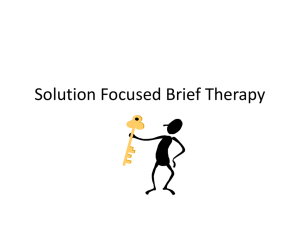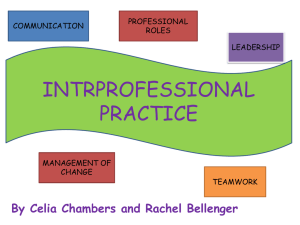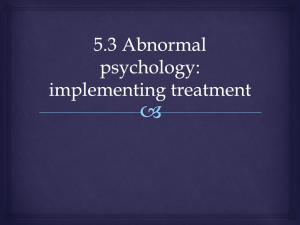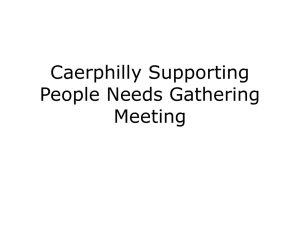Wellbeing workshops for parents in Caerphilly. A preventative
advertisement
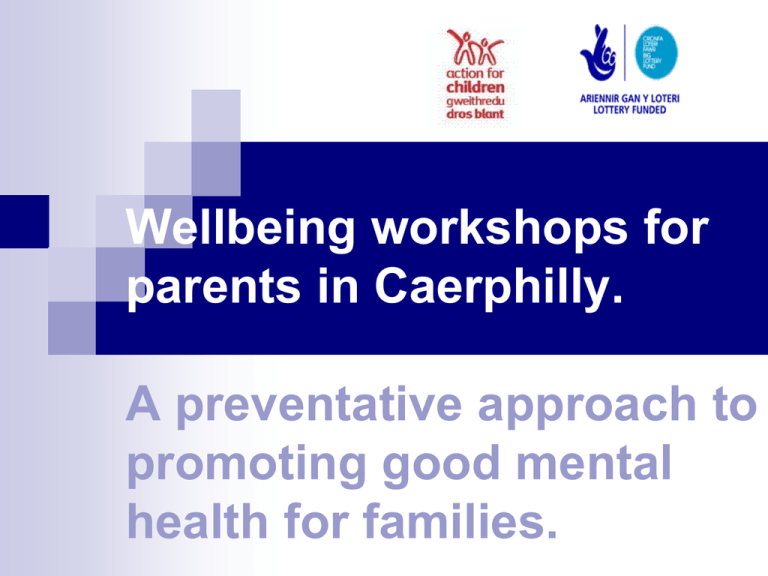
Wellbeing workshops for parents in Caerphilly. A preventative approach to promoting good mental health for families. Our Context the parent therapist sits within a team that is set up to offer time limited and focused interventions to children and their families, supporting emotional and behavioural development. the parent therapist offers an additional service for adults (parents) that supports mental health and wellbeing. the parent therapist receives referrals from within the team the parent therapist sits within an action for children project- the family intervention team but is funded by the big lottery’s mental health matters fund. Models systems thinking solution focused brief therapy cognitive behavioural therapy attachment theory risk and resilience model mindfulness Methods Individual counselling Psychotherapy Couples therapy Family therapy Wellbeing workshops How it looks PARENT THERAPIST SERVICE SYSTEMIC PSYCHOTHERAPY INDIVIDUALS AND COUPLES FAMILY THERAPY CLINIC COGNITIVE BEHAVIOURAL THERAPY SOLUTION FOCUSED BRIEF THERAPY WELLBEING GROUPS INDIVIDUALS INDIVIDUALS INDIVIDUALS AND COUPLES HOW IT LOOKS IN WIDER CONTEXT SYSTEMIC THINKING MENTAL HEALTH PROMOTION WITHIN THE TEAM PSYCHOTHERAPY FAMILY THERAPY CLINIC CONSULTATION TO CASES/ REFLECTING TEAMS COMMUNITY DEVELOPMENT CONSULTATION TO MENTAL HEALTH TEAMS EARLY INTERVENTION IN PSYCHOSIS INTER-AGENCY COLLABORATION GOFAL, HAFAL, MIIND, MINDFULNESS CENTRE, CAMHS, PMHT, PSYCHOLOGY, GP COUNSELLING SERVICE, CMHTS HEALTH CHALLENGE CAERPHILLY Research In our own research 2006/07 80% of parents/carers identified as having mental health issues Other researchWHO Report 2001 suggests at least 1 in 4 families have at least one member with a mental health “disorder”, with depression as most common. Up to 3 x more common in women 60% of adults (receiving services) with diagnosed mental health had children under 16 Further research National averageIs significantly higher in Wales than in England. An example of cross studies across boroughs – at any one time approx 320 adults may receive community based mental health support in Wales in 2008 (compare to average of 169 in England) (Local Govt Data Unit Wales 2008) A higher percentage of women (12%) than men (7%) reported being treated for a mental illness. This pattern applies to all age groups. This is significant in thinking about parental mental health and often the primary (or sole) care giver is the mother. Local Research Local statisticsCaerphilly scored 4th lowest out of the 22 Welsh boroughs in rating individual mental health. “Caerphilly CBC Mental Health and Wellbeing Promotion Action Plan” (2008) Caerphilly residents were the 4th highest in receipt of mental health services. The prevalence of mild to moderate mental health problems in Caerphilly is 18.2% Why a service for adults in Action For Children? 2001 Everybody’s business (CAMHS) suggested that 40% of children and young people have recognisable risk factors in mental health. 3040% will experience a problem at some point. Up to 25% will have a diagnostic disorder Rutter and Quinton (1984) highlight the relationship between parental mental health and increased rate of psychopathology in children. Why is this important? “When the main carer is a parent who has mental illness …. is preoccupied or emotionally unavailable, it would be hard for a child to have a sustained experience of feeling contained, of having their distress or confusion understood and returned to the child in a more digested form”. (Bion 1962 in Hindle, 1998) Outcomes To enhance the quality of life for families To improve emotional wellbeing To improve and maintain positive relationships For families to make informed choices about their health and wellbeing For families to have improved health To increase family stability To increase parents’ capacity to cope with difficulties To decrease referrals to higher tier mental health services Evaluation Pre and post questionnaires CORE (clinical outcomes in routine evaluation) Verbal feedback and case studies Telephone interviews Parents forum Current External Evaluation- University of Glamorgan/ Family Institute Previous service evaluation includesNEF and Red Kite Consultancy. http://www.neweconomics.org/press-releases/investingyoung-would-save-%C2%A3486-billion-150909 http://www.actionforchildren.org.uk/uploads/media/36/98 12.pdf Some further links DVD from bbc 3 series http://www.bbc.co.uk/iplayer/episode/b00tf 1zt/tulisa_my_mum_and_me/ Dr Alan Cooklin DVD (available from royal college of psychiatry) http://www.rcpsych.ac.uk/mentalhealthinfof orall/youngpeople/caringforaparent.aspx FOR MORE INFORMATION Contact Leah atLeah.Salter@actionforchildren.org.uk Check out :Salter, L and Hardy, B (2010) “Crossing the bridge: to dip our toes in the water? Learning to take tentative steps towards setting up and delivering a service for adults within a children’s voluntary organisation.” In Context, April 2010 Context - The Association for Family Therapy in the UK http://www.aft.org.uk/publications/Context108.asp Referrals in to FIT/5+ Health Social Services Education Voluntary Case study 1st hand account- Sarah In 2009 I contacted my GP with the very much needed help from someone who could give me some advice. I found myself at the point of no return with my 8 year old son Jack. Our home life was very much concerning me. I didn’t seem to have any control or respect from Jack. His behaviour got to a point that everyone and everything in our home was very unsettled. Jack didn’t seem to have any control of his own temper and moods. Jack would lash out on anyone or anything that was in his way. I felt totally lost and couldn’t do or say anything to calm him down. I’m sure Jack felt very much the same in his own mind. With the help of (the family therapist) I was able to understand that our friendship had broken down, and that we needed to rebuild. We really want Jack to feel safe and sure that he can open up and talk to us about anything on his mind. Over time, meeting with the Family Therapist, I started to feel my confidence to (talk with) Jack, and find the right way to start talking. Jack seems calmer now. With difficult days and I’m sure more to come, I’ve been able to talk to Jack through his moods. I now feel that I can cope with all that happens with us as a family. I’ll always be very grateful for the Family Intervention Team for their listening and helpful suggestions. The therapist’s view Sarah had previously been in an abusive relationship with Jack’s father, and though she has remarried and in a very different relationship this past experience was effecting her own sense of self and her perception of her relationship with her son. Sarah and (the family therapist) met on a 1-1 basis for 6 sessions, opening up a space to talk about Sarah’s previous experiences and process the feelings that this had left her with. We were able, though talking, to begin to shift Sarah’s perception of the relationship from being about failure to being about competence. A new story emerged of a woman who had freed both herself and her children from an abusive relationship. Issues at point of referral 50 A: Beh < 1 yr 45 D: M anagement 40 35 30 25 20 15 E: Separation B: Relationships K: Other F: Trauma H: Eating 5 C: Stimulation 0 I: School G: Anxiety 10 J: Attendance Wanless Report and local action plan This project fits with the overall aim of improving access to services through primary care. To borrow directly from the Wanless action plan which asks forpartners (to) work together to manage demand within the most appropriate parts of the system ….. to meet appropriate demand in primary and community settings. … to radically reform primary health and social care service provision in Caerphilly Borough increase capacity in non-institutional settings ….to maintain patients’ independence avoid deterioration in patients’ conditions by more active primary and community-based support. involvement of the Voluntary Sector as crucial in all of this work. increase opportunities and access to healthy lifestyle choices. The wrong choices are currently having a major impact on levels of disease and are seriously affecting many people’s lives. AimsImprove local access to services • Develop a sustainable system of services • Improve integration between services and providers • Minimise institutional care •(create a ) balance i.e. maximising service user choice and minimising risk • Promote equity of access and social inclusion • Ensure Continuous improvement • Be supportive of carers Risk/ Resilience matrix Resilience “Normal development under difficult conditions” e.g. being female, secure attachment experience, an outgoing temperament, sociability, problemsolving skills Adversity Protective Factors Life events or circumstances which pose a threat to healthy development, e.g. racism, parental depression, domestic violence Factors which buffer the effects of adversity e.g. a good school experience, an alternative caregiver Vulnerability Those characteristics of the child, their family circle and wider community which might threaten or challenge healthy development e.g. an “unusual” temperament, isolated parent, lack of community support, poor housing From Child Development for Child Care and Protection Workers by Brigid Daniel, Sally Wassell and Robbie Gilligan, 1999, Jessica Kingsley, p.61 Further local stats A recent review by CSCB highlighted a number of key factors in registration. Caerphilly has a greater number of children added to the CPR than the national average. Re-registrations and lengthier registrations are most likely to be under the category of neglect. In the cases reviewedDomestic violence was a factor in 55%; parental drug and alcohol misuse in 60% and parental mental health in 55%. Some more quotes “I was completely satisfied with the help I received with my daughter which has shown a big improvement in her attitude and confidence.” “The project was fantastic – I don’t know how I would have managed without them.” “The work that s/he (project worker) has done with myself and my child has helped a great deal and family life is much better than before.” I would like to thank the team for their support during this hard time – it was much needed support.”



